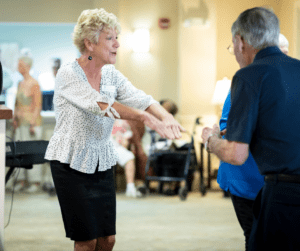Exploring Senior Living Options: Independent Living, Assisted Living, and Memory Care
February 12, 2025
As we age, our housing needs evolve, and finding the right senior living option is an important decision. There are a variety of living options, including independent living, assisted living, and memory care. Each provides unique benefits tailored to specific stages of life and levels of support. Let’s explore these options in detail and discuss how companies like Grace Management, Inc. excel in providing compassionate, high-quality senior living services.
Independent Living: A Lifestyle of Freedom and Convenience
What Is Independent Living?
Independent living is designed for active older adults who are able to manage their daily routines but seek a maintenance-free lifestyle. These communities offer private apartments or cottages, paired with social and recreational amenities.
Key Features and Benefits:
- Freedom from Home Maintenance: Independent living eliminates the need to handle tasks like lawn care, housekeeping, and home repairs.
- Community and Social Engagement: Residents can participate in a range of activities, including group fitness classes, book clubs, and organized outings.
- Convenience and Safety: Many communities offer dining services, transportation, and 24-hour staff availability, ensuring peace of mind.
- Wellness Programs: Independent living promotes a healthy lifestyle through on-site wellness programs and fitness facilities.
Assisted Living: A Bridge Between Independence and Care
What Is Assisted Living?
Assisted living is designed for older adults who value their independence but require help with certain daily tasks, such as dressing, bathing, or medication management. These communities provide a supportive environment, enabling residents to maintain a sense of autonomy while receiving necessary assistance.
Key Features and Benefits:
- Personalized Care Plans: Each resident receives tailored care to match their specific needs, fostering independence while ensuring safety.
- Social Opportunities: Assisted living communities encourage residents to build friendships and enjoy life through organized events and communal dining.
- On-Site Services: Amenities like salons, therapy services, and transportation simplify daily life for residents.
- Safety and Security: With emergency response systems and trained associates available 24/7, residents and their families can rest assured their loved ones are cared for.
Memory Care: Specialized Support for Cognitive Decline
What Is Memory Care?
Memory care communities cater to individuals with Alzheimer’s disease, dementia, or other forms of cognitive decline. These communities provide a secure, nurturing environment with specialized programs to enhance residents’ quality of life and slow cognitive decline.
Key Features and Benefits:
- Trained Associates: Caregivers in memory care communities receive specialized training to address the unique needs of residents with memory loss.
- Structured Routines: Daily schedules help reduce confusion and anxiety, providing a sense of stability.
- Engaging Activities: Programs such as music therapy, art classes, and memory games promote mental stimulation and emotional well-being.
- Secure Environment: Memory care communities have enhanced security measures, such as locked doors and monitoring systems, to prevent wandering.
Grace Management, Inc.: Elevating the Senior Living Experience
Grace Management, Inc. is a trusted leader in senior living, offering a range of services across independent living, assisted living, and memory care communities. With a mission to create environments where seniors thrive, Grace Management, Inc. emphasizes personalized care, holistic wellness, and a sense of belonging.
Core Values and Approach:
- Person-Centered Care: Grace Management prioritizes each resident’s individuality, crafting tailored care plans to support their physical, emotional, and social well-being.
- Commitment to Excellence: Grace Management continually invests in training, innovative programs, and modern facilities to provide the highest quality of care.
- Vibrant Living: Our Vibrant Living Program offers fun, enriching opportunities reflective of our community’s culture and the preferences of the residents who live here, celebrating the seasons and milestones of aging with four guiding pillars: Purpose, Curiosity, Creativity, and Fun!
- Wellness: A positive outlook is a vital aspect of the connections we make and the plans we build for the future. Our distinctive approach to senior living treats life as the incredible gift that it is. This is our genuine desire each and every day: to support older adults in living up to their full potential and provide a wide range of services from caring staff and dedicated therapy providers to meet our goals and theirs.
How to Choose the Right Senior Living Option
Selecting the best senior living option requires careful consideration of your loved one’s current needs, preferences, and future care requirements. Here are some steps to guide your decision-making process:
- Assess Care Needs: Evaluate physical health, cognitive abilities, and daily living requirements to determine the level of support needed.
- Consider Lifestyle Preferences: Take into account desired amenities, social opportunities, and location preferences.
- Visit Communities: Schedule tours of prospective communities to experience the atmosphere, meet staff, and explore facilities.
- Review Costs and Services: Understand the pricing structure and what services are included. Some communities, like those managed by Grace Management, offer flexible options to suit various budgets.
- Consult Healthcare Professionals: Seek advice from doctors or care managers to ensure the chosen community aligns with medical needs.
The Grace Management Difference
Choosing Grace Management, Inc. for senior living means choosing a partner dedicated to enhancing quality of life. Whether your loved one thrives in the independence of an active lifestyle, benefits from the support of assisted living, or requires the specialized care of a memory care community, Grace Management offers compassionate services tailored to every stage of aging.
With a focus on creating vibrant communities, fostering personal connections, and delivering top-tier care, Grace Management truly stands out as a leader in senior living. As you explore your options, remember that the right community can provide not only care but also a renewed sense of purpose and joy. With expert providers like Grace Management, Inc., families can feel confident that their loved ones will receive the support, respect, and community they deserve. Whether it’s simplifying daily life, fostering independence, or offering specialized care, senior living communities enrich the lives of residents, ensuring they age with dignity and fulfillment.









